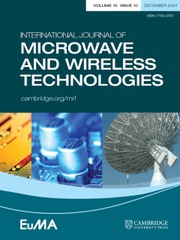Wideband, high-efficiency, high-power GaN amplifiers, using MIC and quasi-MMIC technologies, in the 1–4 GHz range
Published online by Cambridge University Press: 09 June 2014
Abstract
In this paper, the designs and experimental performances of wideband (higher than one octave) high-efficiency, high-power amplifiers (HPA) working in the 1–4 GHz range, using the same GaN process, are presented. They are based on the Bode–Fano integrals, which can be applied to a trade-off calculation between bandwidth and efficiency. Firstly, an microwave intregrated circuits (MIC) wideband HPA, externally matched, is presented. It generates a continuous wave (CW) output power (Pout) greater than 40 W, a power gain (GP) higher than 9.2 dB and a corresponding power added efficiency (PAE) (drain efficiency (DE)) ranged between 36 and 44% (40 and 48%) over the 1–3 GHz bandwidth. Two other amplifiers have been designed upon the same theoretical methodology, with a passive GaAs MMIC circuit technology, enabling to reduce the final size down to 420 mm2. The first internally matched Quasi monolithic microwave intergrated circuits (Quasi-MMIC) single-ended HPA generates a pulsed Pout greater than 25 W, GP higher than 9.8 dB, and a corresponding PAE (DE) ranged between 37 and 52.5% (40 and 55%) over the 2–4 GHz bandwidth. The second internally matched Quasi-MMIC HPA, based on balanced architecture, generates a pulsed Pout higher than 45 W, GP higher than 9.5 dB and PAE (DE) ranged between 33 and 44% (38 and 50%) over the 2–4 GHz bandwidth. These results are among the best ones published in terms of PAE and Pout in instantaneous octave bandwidth in the 1–4 GHz frequency range.
- Type
- Research Papers
- Information
- International Journal of Microwave and Wireless Technologies , Volume 7 , Issue 1 , February 2015 , pp. 1 - 12
- Copyright
- Copyright © Published by Cambridge University Press 2014
References
REFERENCES
- 7
- Cited by


